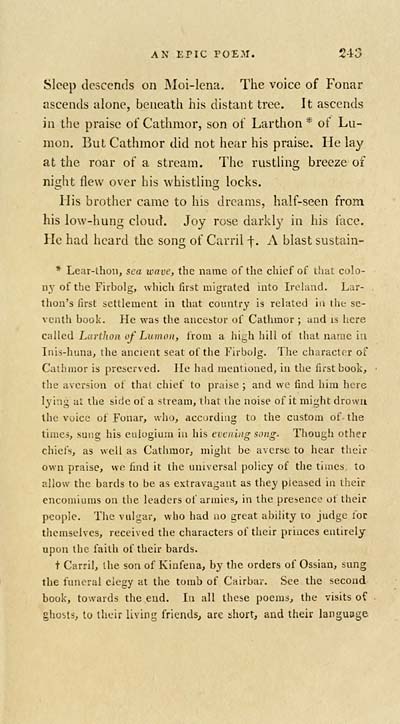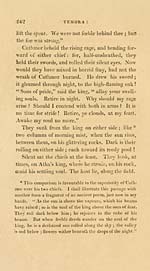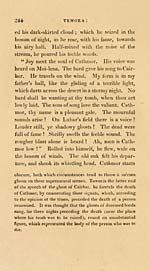Ossian Collection > Poems of Ossian > Volume 3
(261)
Download files
Complete book:
Individual page:
Thumbnail gallery: Grid view | List view

AN EPIC roEM. 243
sleep descends on INIoi-lena. The voice of Fonar
ascends alone, beneath his distant tree. It ascends
in the praise of Cathmor, son of Larthon* of Lu-
nion. But Cathmor did not hear his praise. He lay
at the roar of a stream. The rustling breeze of
night flew over his whistling locks.
His brother came to his dreams, half-seen from
his low-hung cloud. Joy rose darkl}' in his face.
He had heard the song of Carril f . A blast sustain-
* Le;ir-tlion, sea wave, the name of the chief of t!iat colo-
ny of the Firbolg, which first migrated into Ireland. Lar-
thon's first settlement in that country is related in the se-
venth book. He was the ancestor of Cathmor ; and is here
called Larthon of Lumon, Irom a high hill of that name in
Inis-huna, the ancient seat of the Firbolg. The character of
Cathmor is preserved. He had nieutioned, in the first book,
the aversion ot thai chief to praise ; and we find him here
lying at the side of a stream, that ihe noise of it might drown
the voice of Fonar, who, according to the custom of the
times, sung his eulogium in his evening song. Though other
chiefs, as well as Cathmor, might be averse to hear their
own praise, we find it the universal policy of the times, to
allow the bards to be as extravagant as they pleased in their
encomiums on the leaders of armies, in the presence of their
people. The vulgar, who had no great ability to judge for
themselves, received the characters of their princes entirely
upon the faith of their bards.
t Carril, the son of Kinfena, by the orders of Ossian, sung
the funeral elegy at the tomb of Cairbar. See the second
book, towards the end. In all these poems, the visits of
ghosts, lo their living friends, are short, and their language
sleep descends on INIoi-lena. The voice of Fonar
ascends alone, beneath his distant tree. It ascends
in the praise of Cathmor, son of Larthon* of Lu-
nion. But Cathmor did not hear his praise. He lay
at the roar of a stream. The rustling breeze of
night flew over his whistling locks.
His brother came to his dreams, half-seen from
his low-hung cloud. Joy rose darkl}' in his face.
He had heard the song of Carril f . A blast sustain-
* Le;ir-tlion, sea wave, the name of the chief of t!iat colo-
ny of the Firbolg, which first migrated into Ireland. Lar-
thon's first settlement in that country is related in the se-
venth book. He was the ancestor of Cathmor ; and is here
called Larthon of Lumon, Irom a high hill of that name in
Inis-huna, the ancient seat of the Firbolg. The character of
Cathmor is preserved. He had nieutioned, in the first book,
the aversion ot thai chief to praise ; and we find him here
lying at the side of a stream, that ihe noise of it might drown
the voice of Fonar, who, according to the custom of the
times, sung his eulogium in his evening song. Though other
chiefs, as well as Cathmor, might be averse to hear their
own praise, we find it the universal policy of the times, to
allow the bards to be as extravagant as they pleased in their
encomiums on the leaders of armies, in the presence of their
people. The vulgar, who had no great ability to judge for
themselves, received the characters of their princes entirely
upon the faith of their bards.
t Carril, the son of Kinfena, by the orders of Ossian, sung
the funeral elegy at the tomb of Cairbar. See the second
book, towards the end. In all these poems, the visits of
ghosts, lo their living friends, are short, and their language
Set display mode to: Large image | Transcription
Images and transcriptions on this page, including medium image downloads, may be used under the Creative Commons Attribution 4.0 International Licence unless otherwise stated. ![]()
| Early Gaelic Book Collections > Ossian Collection > Poems of Ossian > Volume 3 > (261) |
|---|
| Permanent URL | https://digital.nls.uk/77620051 |
|---|
| Description | Volume III. |
|---|---|
| Shelfmark | Oss.62 |
| Attribution and copyright: |
|
| Description | "Translated by James Macpherson ; the engravings by James Fittler, A.R.A., from pictures by Henry Singleton." |
|---|---|
| Shelfmark | Oss.60-62 |
| Additional NLS resources: | |
| Description | Selected books from the Ossian Collection of 327 volumes, originally assembled by J. Norman Methven of Perth. Different editions and translations of James MacPherson's epic poem 'Ossian', some with a map of the 'Kingdom of Connor'. Also secondary material relating to Ossianic poetry and the Ossian controversy. |
|---|
| Description | Selected items from five 'Special and Named Printed Collections'. Includes books in Gaelic and other Celtic languages, works about the Gaels, their languages, literature, culture and history. |
|---|

